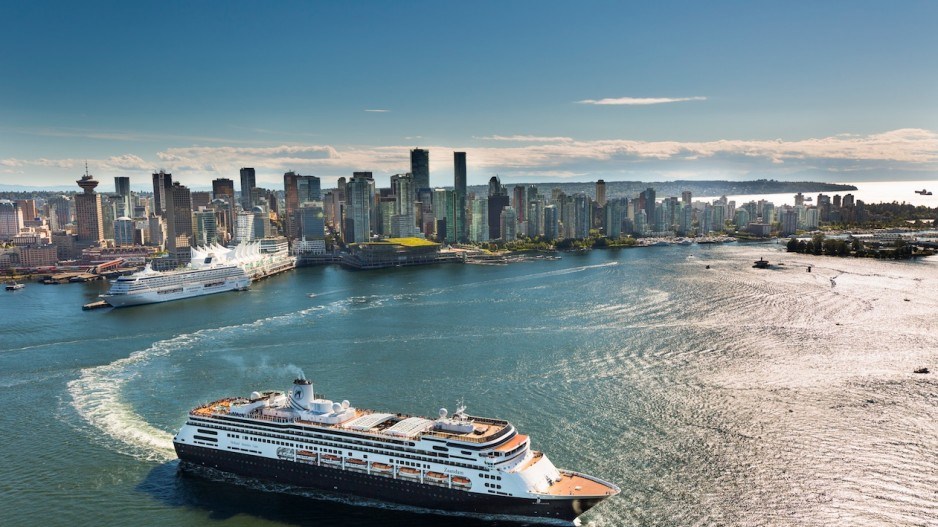Utah Senator Mike Lee has tabled three bills in the U.S. Senate that take aim at B.C.'s cruise sector.
The bills' intent is to permanently change U.S. law in a way that would allow foreign-flagged cruise ships to travel directly between U.S. ports without touching a foreign country.
That would mean that Seattle-to-Alaska voyages could skip stops in B.C., such as in Victoria or Vancouver, and be a blow to the province's tourism sector.
Vancouver Fraser Port Authority data show that Vancouver welcomed more than one million passengers in 2019. It estimated that each docked cruise ship brings in about $3 million in economic impact to Metro Vancouver.
Cruise Lines International Association (CLIA) data show that when other B.C. ports are included, the province welcomed 1,792,400 passengers in 2019.
That helped generate a direct and indirect economic impact on the province worth more than $2.7 billion. CLIA pinned the number of direct and indirect cruise-related jobs in B.C. pre-pandemic at 17,379, worth $878.6 million in wages.
Both houses in the U.S. Congress recently unanimously passed a bill to temporarily allow cruise ships on Alaskan voyages to bypass B.C., after the Canadian government banned those ships from docking in Canada to limit the spread of COVID-19. U.S. President Joe Biden then signed that bill into law.
That law, which allows ships to temporarily bypass B.C. when headed to Alaska, stipulates that it will cease to be in effect as soon as Canada reopens its ports.
Canada's ban on cruise ships docking at its ports is in effect until February 28, 2022, and that ban applies to all commercial vessels carrying more than 100 passengers.
Greater Victoria Harbour Authority CEO Ian Robertson told BIV on June 10 that Canadian Prime Minister Justin Trudeau should be clear that the ban on foreign cruise ships docking in Canada will not be extended, and that these vessels will be welcome in 2022.
"The cruise lines need some certainty, and I think it was the uncertainty that caused this whole thing to happen," he said.
Robertson said his organization originally supported Ottawa's ban on cruise travel, due to COVID-19, but things are changing and policies need to keep pace.
"We're seeing everyone, or a lot of people, getting vaccinated, and the passengers are tested, and they are vaccinated on the ships," he said. "The risk to Canadians is very, very low."
The rationale for the 135-year-old Passenger Vessel Services Act (PVSA), was to protect the U.S. shipbuilding sector. In order to be a U.S.-flagged ship, the vessel must not only be registered in the U.S., and pay U.S. taxes, but it also must be constructed in the U.S.
No U.S. ship-building facilities now make cruise ships, so the reality is that there are no new cruise ships that are eligible to travel between two U.S. ports without stopping at a foreign port.
The only exception to the restriction is for far-flung U.S. ports, such as American Samoa.
“The PVSA is bad news,” Lee said in a June 10 statement. “This arcane law benefits Canada, Mexico, and other countries who receive increased maritime traffic, at the expense of American workers in our coastal cities, towns, and ports."
He said that the result of the law is reduced demand for jobs and travel opportunities in the U.S.
"In the context of ocean liners, this ‘protectionist’ law is literally protecting no one, as there hasn’t been a cruise ship built domestically in over half a century. The PVSA is bad economics and bad law, and it’s far past time that Congress reconsider it.”
Alaska Representative Don Young had implored B.C. Premier John Horgan to urge the federal government to allow so-called "technical calls," which would allow cruise ships to dock at Canadian ports as long as no one leaves the vessels.
When Young threatened to introduce legislation in Congress to allow a temporary override to the PVSA, Horgan dismissed his effort as a "blip along the way as a result of frustration by Alaska," and something that was not likely to be successful.
When the initiative passed in Congress, Young, on May 20, tweeted to Horgan, saying "don't underestimate Don Young and the Alaska delegation. Our bill, the 'blip' as you say, is now headed to be signed into law."
The debate about whether to allow technical calls at ports, however, is long over, according to Robertson.
"Technical calls are not viable at this time," he said. "It is too late. The cruise lines have got what they wanted, and they are able to sail between Seattle and Alaska."
